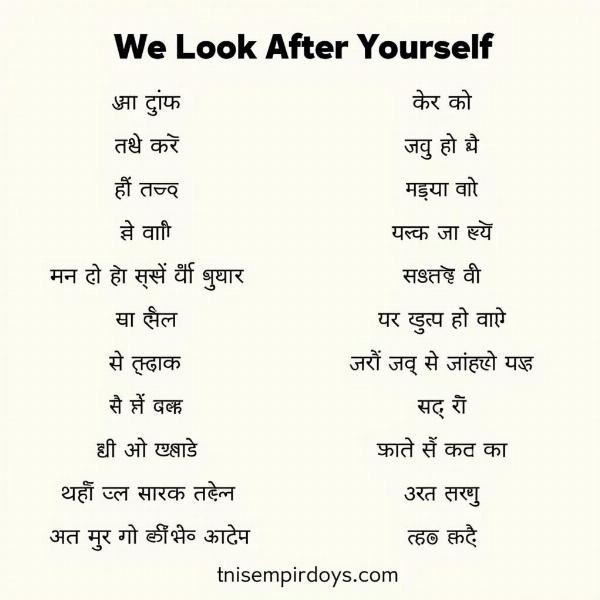Understanding the phrase “look after yourself” and its various nuances in Hindi is crucial for anyone navigating Indian culture or simply seeking to broaden their linguistic horizons. This phrase, while seemingly simple, carries a depth of meaning that extends beyond mere physical well-being. It encapsulates a genuine concern for someone’s overall welfare and often serves as a parting remark imbued with warmth and care. Let’s delve into the rich tapestry of its Hindi translations and explore the cultural context that shapes its usage.
Decoding “Look After Yourself” in Hindi
The most common and straightforward Hindi translation for “look after yourself” is अपना ख्याल रखना (apna khyal rakhna). This phrase literally translates to “keep your care,” effectively conveying the message of self-preservation and well-being. It’s suitable for both formal and informal settings, reflecting a general concern for the other person. However, the beauty of Hindi lies in its diverse vocabulary, allowing for more nuanced expressions of this sentiment.
Exploring Alternative Translations and Their Contexts
Beyond the standard translation, several other phrases capture the essence of “look after yourself” with varying degrees of formality and emotional depth. खुश रहो (khush raho), meaning “stay happy,” conveys a wish for the other person’s emotional well-being. सावधान रहना (savdhan rahna), meaning “be careful,” emphasizes safety and vigilance. संभल कर रहना (sambhal kar rahna) carries a similar connotation, urging caution and prudence. Choosing the right phrase depends on the context and the relationship between the speakers.
 Hindi Translation of Look After Yourself
Hindi Translation of Look After Yourself
The Cultural Significance of Caring in Indian Society
In Indian culture, expressing care and concern for others is deeply ingrained. It reflects the collectivist nature of society, where interpersonal relationships and community bonds are highly valued. The phrase “look after yourself” isn’t merely a polite parting remark; it’s an expression of genuine solicitude. It often signifies a shared responsibility for each other’s well-being, particularly within family and close-knit communities.
The Importance of Family and Community
Family plays a central role in Indian society, and expressions of care are integral to familial interactions. Elders often use phrases like “apna khyal rakhna” to impart wisdom and express their protective instincts towards younger family members. Similarly, within communities, showing concern for one another’s welfare fosters a sense of belonging and mutual support.
“Look After Yourself” in Everyday Conversations
Imagine you’re at a bustling Indian marketplace, haggling over the price of spices. As you conclude your purchase, the shopkeeper might say, “apna khyal rakhna,” conveying a sense of goodwill beyond the mere transaction. Or perhaps you’re bidding farewell to a friend after a lively chai session. “Khush raho,” you might say, wishing them continued happiness.
Practical Examples and Usage
From casual encounters to heartfelt goodbyes, “look after yourself” and its Hindi equivalents permeate everyday conversations. They reflect the inherent warmth and hospitality that characterize Indian culture. These phrases serve as a constant reminder of the interconnectedness of human lives and the importance of mutual care and respect.
Conclusion
“Look after yourself meaning in Hindi” encompasses a spectrum of expressions that go beyond literal translation. From the common “apna khyal rakhna” to the more nuanced “khush raho” and “savdhan rahna,” each phrase carries its own weight of cultural significance and emotional depth. Understanding these nuances allows for a deeper appreciation of the Indian ethos of care and interconnectedness. So, the next time you bid farewell to someone, remember the warmth and genuine concern embodied in these simple yet profound phrases.
FAQ
- What is the most common Hindi translation for “look after yourself”? Apna khyal rakhna (अपना ख्याल रखना) is the most commonly used phrase.
- What are some other ways to say “look after yourself” in Hindi? Other phrases include khush raho (खुश रहो), savdhan rahna (सावधान रहना), and sambhal kar rahna (संभल कर रहना).
- Why is expressing care important in Indian culture? Expressing care reflects the strong emphasis on relationships and community in Indian society.
- How is “look after yourself” used in everyday conversations? It’s used as a parting remark, expressing genuine concern and goodwill.
- What is the cultural significance of “look after yourself” in India? It signifies a shared responsibility for each other’s well-being and reflects the collectivist nature of Indian culture.
Meaning-Hindi.in is your premier resource for high-quality Hindi translation services. We offer a comprehensive suite of solutions, including business and commercial document translation, certified and legal document translation, technical and user manual translation, website and localization services, educational and academic document translation, and expedited translation services for all your specialized needs. Need accurate and culturally sensitive translations? Contact us at [email protected] or call us at +91 11-4502-7584. Meaning-Hindi.in is your trusted partner for bridging the language gap.